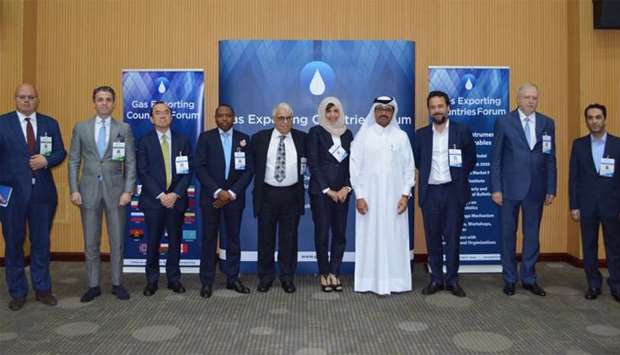The outgoing decade has not only seen the Gas Exporting Countries Forum serving to its goal of making natural gas a viable shareholder of the world’s energy mix, but also consolidation on the GECF’s status as a reference point on matters pertaining to the ‘blue fuel’, said the former Minister of Energy and Industry, HE Dr Mohamed bin Saleh al-Sada.
He was speaking as a guest of honour at the workshop organised by GECF in Doha recently.
Delivering the keynote speech on behalf of the GECF Secretariat, Mahdjouba Belaifa, head, Gas Market Analysis Department, said the GECF’s Global Gas Outlook projects global energy demand to increase by 30% over the next three decades.
Meanwhile, natural gas and oil are expected to continue to play a dominant role in the global energy mix, amounting over 50% of primary energy by 2050. On this background, oil and gas industries have to meet global environmental challenges and address the request of modern society for low carbon development.
Due to its inherent eco-friendly nature, natural gas is considered as the destination fuel, key contributor in the energy transitions and in accomplishment of the UN Sustainable Development Goals, as well as ambitious targets of the Paris Agreement.
Apart from the other strategic documents – GECF Statute, long-term strategy, previous summits’ declarations, ministerial meetings and other high-level meetings’ summaries of decisions – environmental advantages of natural gas have recently been reemphasised in the “Declaration of Malabo”, the strategic document, approved by the member countries’ heads of state and government at the 5th GECF Gas Summit.
Based on that, the GECF continues to promote the usage of natural gas and seeks possibilities to reach markets deprived of access to energy. This activity gains specific importance when it comes to the UN SDG #7 accomplishment as regards to ensuring access to affordable, reliable, sustainable and modern energy for all.
The first session under the topic “Enablers for natural gas demand stimulation: current status, what are the challenges, opportunities & through which instruments?”, moderated by Nikolay Kozhanov, research associate professor at Qatar University, recalled both 2018 and 2019 Communiques of the G20 Ministerial Meetings on Energy Transitions and witnessed the speakers acknowledging the central role of natural gas in many of the G20 countries in energy transition towards a lower emissions future, and its potential to expand significantly over the coming decades.
The second session and the special presentation elaborated on the research and development activities pushed forward by the industry majors.
It was specifically highlighted that the GECF Gas Research Institute, based in Algeria, has emerged as a tangible technical and technological arm of the forum, focused on disruptive technologies and the best practices sharing, especially in finding solutions to CO2 and methane emissions from natural gas.
Throughout the whole discussion, energy experts and business captains exchanged their views on the geopolitical context of energy markets.
Echoing the 2nd GECF International Gas Seminar, held on the sidelines of the 5th Summit just a month ago, discussion on the monetisation of natural gas highlighted the central role of advanced technologies in the development of energy rich countries, especially on the African continent.
This year’s edition of the workshop was organised with the support of Qatar University, and valuable participation of the Abdullah Bin Hamad Al-Attiyah International Foundation for Energy and Sustainable Development, Gazprom, Total E&P Qatar, Boston Consulting Group, National Iranian Gas Company, McKinsey and Co, ExxonMobil Qatar, Novatek, Al Khaleej Gas, Nigerian National Petroleum Corporation, Chiyoda Almana Engineering and others.
The debates embraced the topics of challenges facing the natural gas market, enablers of natural gas demand stimulation, inclusive cooperation between energy producers and consumers as a driver for “win-win” solutions, and advocacy for natural gas as the fuel of choice in the 21st century.

